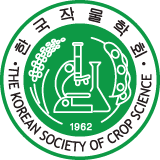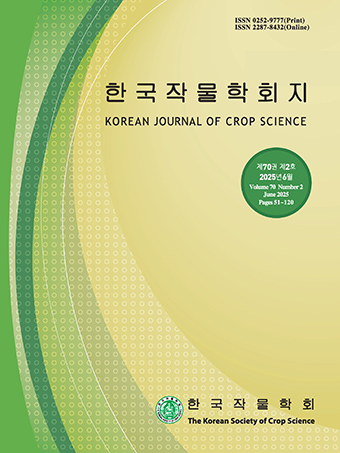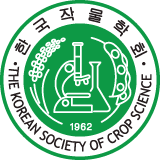Original Research Article
An, S. I., K. J. Ha, K. H. Seo, S. W. Yeh, S. K. Min, and C. H. Ho. 2011. A review of recent climate trends and causes over the Korean peninsula. Clim. Change Res. 2(4) : 237-251.
Cho, E. Y. 2009. The effects of climate change on agricultural production. MS dissertation. Sookmyung Women's University. Seoul, Korea. (in Korean with English abstract).
Choi, K. J., T. S. Park, C. K. Lee, J. T. Kim, J. H. Kim, K. Y. Ha, W. H. Yang, C. K. Lee, K. S. Kwak, H. K. Park, J. K. Nam, J. I. Kim, G. J. Han, Y. S. Cho, Y. H. Park, S. W. Han, J. R. Kim, S. Y. Lee, H. G. Choi, S. H. Cho, H. G. Park, D. J. Ahn, W. K. Joung, S. I. Han, S. Y. Kim, K. C. Jang, S. H. Oh, W. D. Seo, J. E. Ra, J. Y. Kim, and H. W. Kang. 2011. Effect of temperature during grain filling stage on grain quality and taste of cooked rice in mid-late maturing rice varieties. Korean J. Crop Sci. 56(4) : 404-412.
10.7740/kjcs.2011.56.4.404Chung, U., K. S. Cho, and B. W. Lee. 2006. Evaluation of site-specific potential for rice production in Korea under the changing climate. Korean Journal of Agricultural and Forest meteorology 8(4) : 229-241.
Hasegawa T., T. Kuwagata, M. Nishimori, Y. Ishigooka, M. Murakami, M. Yoshimoto, M. Kondo, T. Ishimaru, S. Sawano, Y. Masaki, and H. Matsuzaki. 2009. Recent warming trends and rice growth and yield in japan. In: Proceeding of the MARCO Symposium. Tsukuba, Japan: National Institute for Agro-Environmental Sciences. p. 51.
IPCC. 2007. Climate change 2007 : Mitigation of climate change. contribution working group Ⅲ to the fourth assessment report of the intergovermental panel on climate change, Cambrige University press, Cambrige, New york, USA.
Jagadish S. V. K., K. Sumfleth, G. Howell, E. Redona, R. Wassmann, and S. Heuer. 2010. Temperature effects on rice : significance and possible adaptation (pp. 19-26). In Advances technologies of rice production for coping with climate change: 'No regret' options for adaptation and mitigation and their potential uptake. Los Banos, Philippines: International Rice Research Institute.
Jagadish S. V. K., P. Q. Craufurd, and T. R. Wheeler. 2007. High temperature stress and spikelet fertility in rice (Oryza sativa L.). J. Exp. Bot. 58: 1627-1635.
10.1093/jxb/erm00317431025Jeong, H. K., and J. H. Han. 2022. Analysis of farmers perceptions of extreme climate events. Journal of Climate Research 13(5) : 649-658.
10.15531/KSCCR.2022.13.5.649Kim, C.G. 2010. Weather impacts on rice production in Korea. Korean Journal of Agricultural management and Policy 37(4) : 621-642.
Kim, H. Y., T. Horie, H. Nakagawa, and K. Wada. 1996. Effects of elevated CO2 concentration and high temperature on growth and yield of rice. Ⅱ. The effect on yield and its components. Jap. J. Crop Sci. 65 : 644-651.
10.1626/jcs.65.644Kim, J. H., W. G. Sang, P. Shin, H. S. Cho, M. C. Seo, B. G. Yoo, and K. S. Kim. 2015. Evaluation of regional climate scenario data for impact assessment of climate change on rice productivity in Korea. J. Crop Sci. Biotech. 18(4) : 257-264.
10.1007/s12892-015-0103-zKim, S. M., J. H. Hwang, J. W. Han, and K. S. Kim. 2020. A panel analysis on the localty of paddy rice yield's response to temperatute conditions: The case of South Korean municipalities. Journal of Climate Change Research 11(6-1) : 597-607.
10.15531/KSCCR.2020.11.6.597Kim, Y. S., K. M. Shim, M. P. Jung, I. T. Choi, and K. K. Kang. 2016. Classification of agroclimatic zones considering the topography characteristics in South Korea. Journal of Climate Change Research 7(4) : 507-512.
10.15531/ksccr.2016.7.4.507Kim, Y. U., K. H. Moon, and B. W. Lee. 2021. Climatic constraints to yield and yield components of temperate japonica rice. Agron. J. 13 : 3489-3497.
10.1002/agj2.20689Kobata T. and N. Uemuli. 2004. High temperatures during the grain-filling period do not reduce the potential grain dry matter increase of rice. Agron. J. 96 : 406-414.
10.2134/agronj2004.0406Korea Meteorological Administration (KMA). 2020. Climate data portal. http://www.climata.go.kr/. Last accessed on June 23, 2020.
Krishnan P., D. K. Swan, C. Bhaskar, S. K. Nayak, and R. N. Dash. 2007. Impact of elevated CO2 and temperature on rice yield and methods of adaptaion as evaluated by crop simulation studies. Agric. Ecosyst. Environ. 122 : 233-242.
10.1016/j.agee.2007.01.019Kwak, T. S. and J. H. Yeo. 2004. Varietal variation of yield related and growth analysis related characters in rice based on ecological traits. J. Korean Soc. Int. Agric. 16(2) : 143-149.
Lee, C. K., J. H. Kim, J. Y. Shon, W. H. Yang, Y. H. Yoon, K. J. Choi, and K. S. Kim. 2012. Impacts of climate change on rice production and adaptation method in Korea as evaluated by simulation study. Korean Journal of Agricultural and Forest Meteorology 14(4) : 207-221.
10.5532/KJAFM.2012.14.4.207Lee, C. K., K. S. Kwak, J. H. Kim, J. Y. Son, and W. H. Yang. 2011. Impacts of climate change and follow-up cropping season shift on growing period and temperature in different rice maturity types. Korean J. Crop Sci. 56(3) : 233-243.
10.7740/kjcs.2011.56.3.233Lee, E. P., R. H. Jang, K. T. Cho, and Y. H. You. 2014. Effects of elevated CO2 concentration and increased temperature on the growth and crop yield of rice (Oryza sativa) cultivars in Korea -cv. Odaebyeo and cv. Saechucheongbyeo-. Journal of Wetlands Research 16(4) : 363-370.
10.17663/JWR.2014.16.4.363Lee, G. K., J. Y. Son, B. Gu, and Y. J. Mo. 2013. Investigation of rice yield and quality change and development of adjustment technique to climate change (in Korean with English abstract). Jeonju, Korea: Rural Development Administration, Research Report.
Lee, J. H. 2014. Evaluation of impact on the essential problem according to the new scenario of climate change. RDA Research Report, 2014.
Lee, S. K. and K, H. Kim. 2018. Predicting potential epidemics of rice leaf blast disease using climate scenarios from the best global climate model selected for individual agro-climatic zones in Korea. Journal of Climate Change Research 9(2) : 133-142.
10.15531/KSCCR.2018.9.2.133Lee, Y. S. and S. H. Lee. 2008. The impacts of climate change on rice yield. Korean J. Geography 12(3) : 405-416.
National Institute of Meteorological Sciences (NIMS). 2004. Development of technology for calculating regional climate scenarios in response to the climate change agreement (III). Meteorological Laboratory Report, MR040C03. 510p.
Okada M., T. Ilzumi, Y. Hayashi, and M. Yokozawa. 2011. Projecting climate change impacts both on rice quality and yield in japan. J. Agric. Meteorol. 67(4) : 285-295.
10.2480/agrmet.67.4.10Peng, S., J. Huang, J. E. Sheehy, R. C. Laza, R. M. Visperas, X. Zhong, G. S. Centeno, G. S. Khush, and K. G. Cassman. 2004. Rice yields decline with higher night temperature from global warming. Proc. Natl. Acad. Sci. 101(27) : 9971-9975.
10.1073/pnas.040372010115226500PMC454199Richard S. J. Tol. 2009. The economic effects of climate change. Journal of economic perspectives 23(2) : 29-51.
10.1257/jep.23.2.29Rural Development Administraion (RDA). 2022. Project plant for collaborative research program to develop new variety summer crop. pp. 3-66.
Satake T. and S. Yoshida. 1978. High temperature-induced sterility in indica rices at flowering. J. Crop Sci. 47 : 6-17.
10.1626/jcs.47.6Sato K. and K. Inba. 1976. High temperature injuries to ripening of the rice plant. 5. An early decline of the assimiliate storing ability of rice grains under high temperature. Proc. Crop Sci. Soc. Jpn 45 : 156-161.
10.1626/jcs.45.156Shin, J. C., C. G. Lee, Y. H. Yoon, and Y. S. Kang. 2000. Impact of climate variability and change on crop productivity. Proceedings of the Korean Society of Crop Science Conference. The Korean Society of Crop Science, Sangnokresort, Chungju, Korea. pp. 12-27.
Shin, J. H., C. M. Han, J. B. Kwon, and S. K. Kim. 2019. Effect of climate on the yield of differnent maturing rice in the yeongnam inland area over the past 20 years. Korean J. Crop Sci. 64(3) : 193-203.
Suzuki M. 1980. Stuies on distinctive patterns of dry matter production in the building process of grain yields in rice plants grown in the warm region in japan. Bull. Kyushu Nat. Agri. Exp. Sta. 20 : 429-494.
Yoshida S. 1981. Foundamentals of rice crop science. International Rice Research Institute, Los Banos, Philippines. 75p.
Yun, S. H. 1986. Crop research in southern mid-mountain area. Annual research report for 1986. Yeungnam crop experiment station.
Yun, S. H. and J. T. Lee. 2001. Climate change impacts on optimum ripening periods of rice plant and its countermeasure in rice cultivation. Korean Journal of Agricultural and Forest Meteorology 3.1 : 55-70.
- Publisher :The Korean Society of Crop Science
- Publisher(Ko) :한국작물학회
- Journal Title :The Korean Journal of Crop Science
- Journal Title(Ko) :한국작물학회지
- Volume : 69
- No :3
- Pages :133-144
- Received Date : 2024-06-05
- Revised Date : 2024-07-23
- Accepted Date : 2024-07-25
- DOI :https://doi.org/10.7740/kjcs.2024.69.3.133




 The Korean Journal of Crop Science
The Korean Journal of Crop Science








